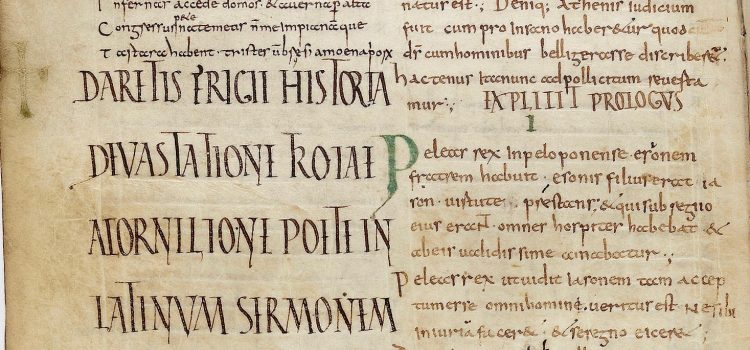
Earliest Manuscripts of Dares of Phrygia’s De excidio Troiae historia *
Among the late antique narratives of the Trojan War, Dares of Phrygia’s De excidio Troiae historia [‘The History of the Destruction of Troy’] was undoubtedly the most influential and popular work throughout the Latin Middle Ages and beyond. The majority of the early medieval manuscripts in which we find witnesses of the De excidio Troiae historia were produced in some of the major centres of the Carolingian period, or in the surrounding regions along the River Rhine, such as Lorsch and St Gall. The evidence indicates an almost exclusively Frankish production and circulation in the early Middle Ages.
Among these early medieval manuscripts, one group of witnesses of the De excidio Troiae historia deserve a special mention. During the eighth century, as the Merovingian dynasty (450–751) gradually lost influence and the Carolingian dynasty (751–987) consolidated its power over Francia, the Trojan narrative received a different kind of attention. Between the 720s and 770s, within around a 50-year period, different versions of the story of the Trojan origins of the Franks began circulating in the Frankish realm. One of these narratives was a rewriting of the De excidio Troiae historia, invariably titled Historia de origine Francorum [‘The History of the Origin of the Franks’] and also attributed to Dares of Phrygia in all the surviving manuscripts.1
| Manuscript | Date | Origin |
|---|---|---|
| Troyes, Bibliothèque municipale, 802 (Part II) | first half of the ninth century | Fulda, Germany |
| Montpellier, Bibliothèque Interuniversitaire, H 158 | second quarter of the ninth century | Burgundy (?), France |
| London, British Library, Harley 3771 | middle of the ninth century | Cologne (?), Germany |
| Milan, Basilica di Sant’Ambrogio, Archivio Capitolare, M 13 | third quarter of the ninth century | northern Italy |
| Vatican City, Biblioteca Apostolica Vaticana, Reg. lat. 213 | third quarter of the ninth century | Abbey of Saint-Remi, Reims, France |
| Leiden, Universiteitsbibliotheek Leiden, VLQ 20 (Part I) | tenth century | Tours, France |
Reframed as the story of the ancestors of the Franks, the Historia de origine Francorum clearly was designed to serve a new purpose, to promote the Trojan origins of the Franks based on an authoritative, ancient source.
For more information about the earliest manuscripts of Dares of Phrygia’s De excidio Troiae historia, read: N. Kıvılcım Yavuz, “Late Antique Accounts of the Trojan War: A Comparative Look at the Manuscript Evidence,” Pecia. Le livre et l’écrit: Special issue on Le manuscrit, entre écriture et texte. 17 (2016): 149–70. DOI: 10.1484/J.PECIA.5.111766 [green open access]
For an analysis of the early reception of Dares of Phrygia’s De excidio Troiae historia as well as Historia de origine Francorum, read: N. Kıvılcım Yavuz, “From Caesar to Charlemagne: The Tradition of Trojan Origins,” The Medieval History Journal: Special issue on Narratives of Ethnic Origins: Eurasian Perspectives. 21.2 (2018): 251–90. DOI: 10.1177/0971945818775372 [green open access]
Notes:
* An article on this topic is currently in progress.
- There are only two nineteenth-century editions of this work:“Historia Daretis Frigii de origine Francorum,” [edited by] Gaston Paris, Romania 3 (1874): 129–44 and“Historia Daretis Frigii de origine Francorum,” in Fredegarii et aliorum chronica. Vitae sanctorum, edited by Bruno Krusch, Monumenta Germaniae Historica. Scriptores rerum Merovingicarum, 2 (Hanover: Hahn, 1888: 194–200).